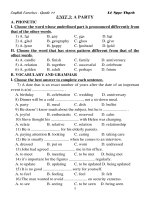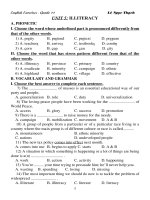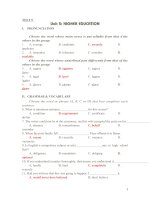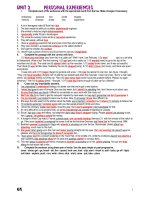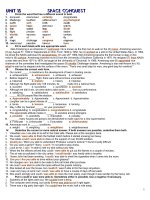11CB UNIT 5 -3 TEST
Bạn đang xem bản rút gọn của tài liệu. Xem và tải ngay bản đầy đủ của tài liệu tại đây (148.36 KB, 9 trang )
UNIT 5 ILLITERACY
III. Complete the sentences with the correct forms of the words from the box.
eradicate literate educate promote effect
honour volunteer provide participate mature
1. We were very pleased with the high level of participation in the charity events.
2. Humour is often far more effective than shouting.
3. I can see an increasing maturity in how she understands the world.
4. They started a campaign for illiteracy eradication in the summer of 2000.
5. I am deeply honoured to be invited to this momentous occasion.
6. We congratulate James on his well-deserved promotion to Chief Executive,
7. All the children are tested in basic literacy.
8. Did he do it voluntarily, or did you make him?
9. The Red Cross is in charge of provision of emergency relief.
10. We found the program educational and informative.
IV. Report each sentence using the verbs below and a to-infinitive clause. Use each verb once only. If
necessary, add an appropriate object after the verb.
advise agree ask call on propose hope order urge
volunteer warn remind invite threaten offer promise
1. 'If I were you, I'd read the exam questions very carefully.
He advised us to read the exam questions very carefully.
2. 'Be quiet!'
He ordered us to be quiet.
3. 'The theater will be built next to' the town hall.'
They proposed to build the theater next to the town hall.
4. 'Okay, I'll collect David from school.'
He agreed to collect David from school.
5. 'Please stay for a few more days.'
She urged me to stay for a few more days.
6. TH fight the ban on smoking in public places.'
He promised to fight the ban on smoking in public places.
7. 'I imagine I'll see Olivia at the party.'
He hoped to se? Olivia at the party.
8. 'Can you lend me ten pounds?'
He asked me to lend him ten pounds./ He asked to borrow ten pounds.
9. 'The government should do more to help the homeless.'
He called on the government to do more to help the homeless.
10. 'I'll take the children into town.'
He offered to take the children into town.
11. 'Don't swim out too far, boys.'
He warned the boys not to swim too far.
12. 'Don't forget to go to the supermarket after work.'
She reminded me to go to the supermarket after work.
13. 'Would you like to come on a picnic with us, Jane?'
He invited Jane to come on a picnic with them.
14. 'If you can't find anyone else, I'll drive you to the airport.'
He volunteered to drive me to the airport (if I couldn't find anyone else).
15. 'I won't give you the money back if you keep on at me.'
He threatened not to give me/ us the money back (if I/ we kept on at him).
V. Underline the correct verb. If either is possible, underline them both.
1. The committee agreed/ suggested to postpone the meeting until 11th August.
2. Emma insisted/ said that we should bring the children along.
3. The prime minister insisted/ wanted to discuss transport policy in the interview.
4. She said/ offered that she would call me back.
5. He expected/ advised to leave at 5.30 in the morning.
6. He claimed/ proposed that the subject of holiday pay should be raised at the next meeting.
7. The shop has guaranteed/ has promised that it will deliver the chairs by the end of the week.
8. She offered/ suggested to wait for the children to get ready.
QN
1
9. Terry wanted/ suggested that I should stand in the student elections.
10. She refused/ requested that her brother should be invited too.
11. He longed/ promised to go back home and see his parents.
12. She promised/ volunteered that she would collect the children from school today.
VI. Complete the sentences with the appropriate phrases, using a clause
beginning with a to-infinitive clause or an -ing form of a verb.
leave the motorway at junction 3 buy a guide book
read through our notes do more exercise
reduce bus and train fares look after the children
listen to the BBC World Service go to the doctor
go for a long walk build it to the east of the city
1. To find my way around London; Les suggested buying a guide book
2. To encourage people to use public transport the council proposed to reduce/ reducing bus and train fares
3. I'd been feeling unwell for a few days and my mother advised going to the doctor
4. I've putting on weight and my doctor has recommended doing more exercise
5. To avoid the road works, police have advised leaving the motorway at junction 3
6. She was going abroad for two weeks and I promised to look after the children
7. To help us prepare for the exam, the teacher advised us to read through our notes
8. To improve her English pronunciation, the teacher recommended her to listen to the BBC World Service
9. London urgently needs a new airport, and the government proposes to build/ building it to the east of the city
10. It was a lovely morning and Emma suggested going for a long walk
VII. Report these sentences. Choose the most appropriate reporting verb in
parentheses. Make it active or passive as appropriate.
1. The teacher said to Jim, 'Would you give your book to Mary, please?'
(ask/ Tell/ order)
The teacher asked Jim to give his book to Mary.
2. The sign said, 'No parking in this area. Violators will be towed away.'
(invite/ warn/ force)
Drivers were warned not to park in the area.
3. The fire chief said, 'Everyone must leave the building immediately.'
(order/ remind/ allow)
Everyone was ordered to leave the building immediately.
4. Before Bobby went to bed, his father said, 'Don't forget to brush your teeth.' (invite/ allow/ remind)
Before Bobby went to bed, his father reminded him to brush his teeth.
5. The teacher said to the students, 'You will have exactly one hour to complete the exam.' (order/ expect/ warn) .
The students were expected to complete the exam in one hour.
6. My garage mechanic said, 'You should get a tune-up every 5,000 miles.'
(ask/ order/ advise)
My garage mechanic advised me to get a tune-up every 5,000 miles.
7. The factory manager said to the employees, 'Do not come late. If you do, you will lost your jobs.' (ask/ warn/
encourage)
The employees were warned not to be late.
8. The sign on the side door says, 'Do not enter,' so we have to use a different door. (ask/ permit/ force)
Nobody is permitted to use the side door.
9. The judge said to the defendant, 'You must not shout in the courtroom again.' (ask/ order/ encourage)
The defendant was ordered not to shout in the courtroom again.
10. My parents often said to me, 'Good for you! It's good to be independent!' (remind/ require/ encourage)
My parents often encouraged me to be independent.
VIII. Complete each of the sentences with one appropriate preposition.
1. The students were asked to provide reading and writing skills for the villagers.
2. More and more people are taking part in the struggle against illiteracy.
3. Let's concentrate on solving this problem before we discuss the other ones.
4. William insists on getting up early, even on weekends.
5. Many companies participated in the trade fair.
6. Many students have difficulty in learning phrasal verbs.
7. The literacy rate of population rised considerably between 1995 and 2002.
8. Each exercise focuses on a different grammar point.
QN
2
9. Interest in physical fitness increased during the 1980s.
10. Do you consider these textbooks essential for the course?
IX. Write the second sentence so that it has a similar meaning to the first.
1. Just when he arrived at the station, the train was starting to move.
Hardly did he arrive at the station when the train was starting to move.
2. Let's go for a walk. We've been working all day.
John suggested going for a walk.
3. The cake was so hard that I could not eat it.
It was such a hard cake that I could not eat it.
4. 'You'd better not waste your time, Betty,' Tom said.
Tom advised Betty not to waste her time.
5. I am sorry that I didn't invite her to my party last night.
I regret not inviting/ having invited her to my birthday party the night before.
6. Mike's father is going to fix the ball for him next week.
Mike is going to have his father fix the ball next week.
7. It is at Mr. Foster's request that I'm writing this letter to you.
Mr Foster requested me to write this letter to you.
8. The cost of living has gone up considerably in the last few years.
There has been a considerable rise in the cost of living for the last few years.
9. I expect that they will get there by lunch time.
I expect them to get there by lunch time.
10. I'm sorry I couldn't come to your birthday party last Sunday, John.
Mary apologizes for not coming to John's birthday party last Sunday.
UNIT 5 TEST 1
I. PRONUNCIATION
Choose the word that has the underlined part pronounced differently from the others.
1. a. minority b. literacy c. primary d. library
2. a. eradicate b. campaign c. vacation d. transport
3. a. straggle b. maturity c. student d. education
4. a. please b. decrease c. speech d. realistic
5. a. ethnic b. northern c. healthy d. south
II. LANGUAGE FOCUS
A. Choose the word or phrase -a, b, c, or d - that best completes the
sentence or substitutes for the underlined word or phrase.
6. The price of petrol has gone ____ by over 50 percent in less than a year.
a. out b. up c. over d. off'
7. At present, more and more people are taking part in the struggle ______ illiteracy
a. for b. with c. against d. to
8. The Vietnam Society of Learning Promotion started a campaign ______ illiteracy eradication.
a. on b. in c. of d. for
9. Most of the students felt that ______ respect in classroom was essential for effective learning to take place.
a. mutual b. considerable c. deep d. grudging
10. Modem farming methods can have an adverse ______ on the environment.
a. effect b. effective c. effectiveness d. effectively
11. Once we have all relevant information, we can make a decision.
a. correct b. connected c. available d. confidential
12. The government has launched a ______ aimed at educating young people about the dangers of drugs.
a. struggle b. program c. combat d. campaign
13. People judged to be functionaIly ______ lack the basic reading and writing skills.
a. literate b. literacy c. illiterate d. illiteracy
14. The students were asked to ______ reading and writing skills to the villagers.
a. deliver b. express c. provide d. support
15. More work has been done to eradicate illiteracy in our country.
a. put up with b. get rid of c. take control of d. cut down on
B. Choose the word or phrase -a, b, c, or d- that best completes the sentence.
QN
3
16. Illiterate people lack the basic reading and writing skills ______ in everyday life.
a. to require b. requiring c. that require d. required
17. Illiteracy rates ______ in recent years.
a. fell b. have fallen c. was falling d. had fallen
18. She was the first in her family ______ a college education.
a. get b. getting c. to get d. gotten
19. They asked ______ our bags outside the exam room.
a. to leave b. us to leave c. we leave d. us leaving
20. Before the meeting finished they arranged when ______ next.
a. they met b. they to meet c. should they meet d. to meet
21. Nobody yet knew what ______ to cause the dam to burst.
a. happens b. to happen c. had happened d. did it happen
22. The weather report says that ______ ten inches of snow tomorrow.
a. may be there are b. there might be
c. there may be d. we maybe have
23. Please ask the restaurant clientele ______ in the no smoking area.
a. not to smoke b. not smoking c. don't smoke d. not smoke
24. 'You got home late last night.' 'The Morgan insisted ______ for dinner.'
a. on our staying b. for us to stay
c. that we were staying d. about us staying
25. ______ in 1636, Harvard is one of the most famous universities in the United States.
a. Founding b. Founded c. Being founded d. It was founded
C. Identify the one underlined word or phrase - A, B, C or D - that must be changed for the sentence to be
correct.
26. The museum guard asked the visitors to not touch the exhibits.
A B C (not to touch) D
27. The tour guide explained that the castle is only open in Tuesdays.
A B C D (on)
28. I'm sorry to bother you, but you did say to call whether I was worried.
A B C D (if)
29. We were disappointed when the receptionist told that the hotel was
A B (told us)
fully booked that week.
C D
30. In 1852 Massachusetts passed a law required all children from four to
A (requiring) B
eighteen years of age to attend school.
C D
III. READING
A. Fill in each blank space with one appropriate word from the box.
advantage qualifications hopefully effective training practical
eradicated worth while unemployment opportunities break
Around the age of sixteen, you must make one of the biggest decisions of your life. Do I stay on at school and
(31) hopefully go on to university later? Do I leave and start work or begin a (32) training course? The decision is
yours, but it may be (33) worth remembering two things: there is more (34) unemployment among who haven't been to
university, and people who have the right skills will have a big (35) advantage in the competition for jobs. If you decide
to go straight into a job, there are many (36) opportunities for training. Getting (37) qualifications will help you to get
on more quickly in many careers, and evening classes allow you to learn (38) while you earn. Starting work and taking a
(39) break to study when you are older is another possibility. This way, you can save up money for your student days,
as well as getting (40) practical work experience.
B. Read the passage carefully, then choose the correct answers.
In the primary school, a child is in a comparatively simple setting and most of the time forms a relationship with one
familiar teacher. On entering secondary school, a new world opens up and frequently it is a much more difficult world.
The pupil soon learns to be less free in the way he speaks to teachers and even to his fellow pupils. He begins to lose
gradually the free and easy ways of the primary school, for he senses the need for a more cautious approach in the
secondary school where there are older pupils, Secondary staff and pupils suffer from the pressures of academic work
and seem to have less time to stop and talk. Teachers with specialist roles may see hundreds of children in a week, and
a pupil may be able to form relationships with very few of the staff. He has to decide which adults are approachable;
good schools will make clear to every young person from the first year what guidance and personal help is available -
but whether the reality of life in the institution actually encourages requests for help is another matter.
QN
4
Adults often forget what a confusing picture school can offer to a child. He sees a great deal of movement, a great
number of people – often rather frightening-looking people - and realizes that an increasing number of choices and
decisions have to be made. As he progresses through the school the confusion may become less but the choices and
decisions required will increase. The school will rightly expect the pupil to take the first steps to obtain the help he needs,
for this is the pattern of adult life for which he has to be prepared, but all the time the opportunities for personal and
group advice must be presented in a way which makes them easy to understand and within easy reach of pupils.
41. According to the passage one of the problems for pupils entering secondary schools is that _________.
a. they are taught by many different teachers
b. they do not attend lessons in every subject
c. the teachers do not want to be friendly
d. the teachers give most attention to the more academic pupils
42. In secondary schools every pupil having problems should _________.
a. be able to discuss 'his problems in class'
b. be able to discuss his problems with any teacher
c. know how to ask for help I
d. be freed from any pressure of academic work.
43. Talking about secondary schools, the author is mainly concerned about _________.
a. academic standards b. the personal development of pupils
c. the role of specialist teachers d. the training of the individual teachers
44. The word 'approachable' means most nearly the same as _________.
a. friendly and easy to talk to b. desirable
c. capable of offering accommodation d. advisable
45. According to the passage adults usually _________.
a. think that children learn better in secondary school
b. neglect their children when they enter secondary school
c. fail to encourage their .children to work hard
d. fail to know how confusing things may be to a child when she enters secondary school.
IV. WRITING
Choose the sentence- a, b, c or d – which is closest in meaning to the printed one.
46. Jane ran into her old friend downtown last week.
a. Jane went downtown to meet her old friend.
b. Jane had to drive her old friend downtown last week.
c. Jane met her old friend downtown unexpectedly.
d. Jane's car crashed into her friend's last week.
47. You should have persuaded him to change his mind.
a. It was essential to persuade him to change his mind but you didn't.
b. You persuaded him to change his mind but he didn't listen.
c. You didn't persuade him to change because he didn't mind.
d. It was diffucult to persuade him to change his mind.
48. I would never have lent Mike my car if I had known that he had a past record of driving violations.
a. I refused to lend Mike my car.
b. Mike got a speeding ticket while driving my car.
c. I knew nothing about Mike's driving record, so I lent him my car.
d. Mike drove my car without his driver's .license. .
49. The court found the man innocent of murdering his wife.
a. The man was judged not guilty of killing his wife.
b. The man was found murdered by his wife.
c. The court found a murdered man and his wife.
d. The court decided that the man had killed his wife.
50. Had I known more about computer programming, I would have worked for a computer company.
a. A better knowledge of computer programming will help me find a job in a computer company.
b. I didn't know much about computer programming, so I didn't work for a computer company.
c. I wish I knew more about computer programming and could work for a computer company.
d. Knowing more about computer programming, I would find a job in a computer company.
UNIT 5 TEST 2
I. PRONUNCIATION
Choose the word that has main stress placed differently from the others.
QN
5



